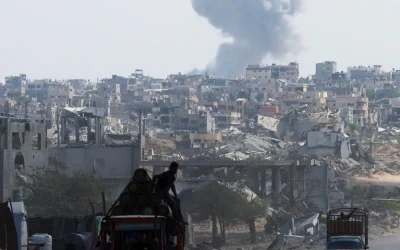As the global community enters the second quarter of 2026, the geopolitical landscape is dominated by the upcoming summit between President Donald Trump and President Xi Jinping, scheduled for the first week of April in Beijing. This meeting follows a period of extreme volatility in bilateral relations that defined the first year of the second Trump administration. Throughout 2025, the relationship was characterized by a reignited trade war, with the United States imposing aggressive reciprocal tariffs that at times reached triple digits on Chinese imports. These measures were met with targeted Chinese retaliation, including boycotts of American agricultural products and export controls on rare earth minerals. However, a significant turning point occurred in October 2025 during a meeting in Busan, South Korea, where both leaders agreed to a one-year trade truce. This temporary reprieve rolled back the most punitive levies and led to a resumption of Chinese purchases of American soybeans and energy, providing a fragile stability that the April summit seeks to formalize and extend.
Foreign Policy
US Incursion in Venezuela: Review, Reactions, and What Happens Next (Foreign Policy Brief #226)
In the early hours of Jan. 3, 2026 the United States carried out an attack in Venezuela that saw the removal and capture of Venezuelan President Nicolas Maduro. The incursion followed months of military operations in the Caribbean Sea, targeting small boats and oil tankers along the Venezuelan coast. The operation dubbed, Operation Absolute Resolve, saw US forces enter Venezuelan territory, carry out strikes on military sites around the country and in the capital Caracas. Nicolas Maduro and his wife, Cilia Flores, were taken by US forces from Fuerte Tiuna, the country’s largest military complex. Maduro was first flown to a US military base and then transported aboard the USS Iwo Jima, which brought Maduro and his wife to a detention centre in New York, where he is being held and indicted on charges of narcoterrorism and conspiracy to import cocaine into the United States.
The Week That Was: Global News in Review (Foreign Policy Brief #225)
European troops have begun arriving in Greenland last week in a show of support to Denmark, as leaders attempt to respond to President Donald Trump’s threats to annex Greenland.
The Week That Was: Global News in Review (Foreign Policy Brief #224)
Latin America’s shift towards the political right has continued following the recent elections in both Chile and Honduras. In Chile the election of the far-right Jose Antonio Kast marked the country’s most significant shift rightward since the former Chilean dictator, Agusto Pinochet. The election of Kast now makes three neighboring South American states formerly at odds, Argentina, Bolivia and Chile, firmly in control by the rightwing and all seeking closer relations with the United States. In Honduras the Trump backed candidate, Nasry Asfura has been declared the winner after a more than two week long vote count left those in the small Central American country in suspense. Following the election results, the opposing Liberal Party candidate, Salvador Nasralla refused to concede and alleged interference in the election process by the United States after President Trump conditioned continued aid to the country on whether the right-wing candidate won. Trump also pardoned the former Honduran President found guilty of trafficking drugs to the United States.
U.S. Deports Russian Dissidents who Face Prison or Draft in Russia (Foreign Policy Brief #223)
In October 2025, U.S. Department of Homeland Security reported on its official website that more than 2 million undocumented immigrants had already left the United States — including 1.6 million who voluntarily self-deported and more than 527,000 who were forcefully deported. “This is just the beginning,” Assistant Secretary Tricia McLaughlin proudly stated.
Breaking the Chains: Niger’s Pivot from Neocolonialism to Sovereignty (Foreign Policy Brief #224)
The July 2023 military takeover in Niger, led by General Abdourahamane Tchiani and the National Council for the Safeguard of the Homeland (CNSP), marked a significant setback for democratic governance in the Sahel. However, the removal of President Mohamed Bazoum must be viewed not merely as an isolated authoritarian power grab, but as a catalyst for a profound geopolitical realignment. In the two years since the coup, the CNSP has systematically dismantled long-standing security frameworks, resulting in the expulsion of French forces in late 2023 and the complete withdrawal of United States military personnel and the closure of key drone bases by September 2024.
The Week That Was: Global News in Review (Foreign Policy Brief #223)
Ukraine’s government has agreed to the core parts of a peace deal brokered by the Trump administration to end the now nearly four year long war. US officials have been meeting with both the Russians and Ukrainians in order to secure an end to the war. The plan was presented as a 28 point peace plan but upon revision by the Ukrainian side has been revised to a 19 point peace plan that no longer includes items such as amnesty regarding acts committed during the war. Ukraine as part of the deal has agreed not to increase the size of its military and will not join NATO under the updated plan.
Should Transgender Athletes be Allowed to Compete? (Foreign Policy Brief #225)
The goal for the IOC now is to create a blanket gender testing policy that would specifically for the 2028 Olympics in Los Angeles. President Trump has been one of the most ardent supporters of policies limiting the participating, or erasing the participation, of transgender athletes in sports at all levels; and has even called for more testing by the IOC ahead of the 2028 Games. President Trump has also made mention of Title IX , a federal law that prohibits sex-based discrimination, as his means of ‘protecting women in women’s sports’ while excluding and perhaps discriminating against transgender athletes. Meanwhile, Democratic lawmakers around the country have fought to create more inclusionary policies. California, currently, allows transgender athletes to participate in sports through the high school level; and their policy is based on gender identity rather than genetics. The Olympics in LA in 2028 are going to be a contentious one to watch on this issue as the stage is being set for inclusive California to be hosting the Olympics who may very well end the inclusionary practices that have been in place since 2000.
Deconstructing “Peace”: Trump’s Settled Conflicts and the Ceasefire Illusion (Foreign Policy Brief #222)
In political discourse, the language of peacemaking is often employed for its potent rhetorical value, yet the terms used can obscure the reality on the ground. A critical distinction must be drawn between a ceasefire and a peace settlement. A ceasefire, or an armistice, is a military and temporal arrangement. It is an agreement to stop active hostilities, to put down the weapons, often temporarily and along existing lines of control. It is a pause. It does not resolve the underlying political, economic, or social grievances that ignited the conflict. A peace settlement, by contrast, is a comprehensive political and legal resolution. It is a formal treaty or agreement that ends the state of war by addressing the root causes—such as sovereignty, borders, justice, and security guarantees—and attempts to build a framework for a new, sustainable relationship.
The Week That Was: Global News in Review Week (Foreign Policy Brief #221)
Since early September, the United States has carried out at least 14 strikes against alleged drug smuggling boats in the Caribbean and Pacific. The US has now deployed fighter jets, warships and thousands of troops to the Caribbean. The military buildup in the region is the largest since 1994 when the United States sent two aircraft carriers and more than 20,000 troops into Haiti to take part in “Operation Uphold Democracy.”
Silence as Strategy: U.S. Denial of Genocide in Gaza (Foreign Policy Brief #220)
In September 2025, a United Nations Commission of Inquiry concluded what many on the ground have known for months: Israel is committing genocide in Gaza. The commission cited deliberate acts—mass civilian killings, destruction of vital infrastructure, deprivation of basic needs, and explicit incitement from Israeli officials—that collectively meet the threshold under the 1948 Genocide Convention.
Europeans no longer feel safe because of Russia; A First Person Account (Foreign Policy Brief #218)
During my trip across Europe a week ago, I spoke with people from different countries — ordinary men and women I met along the way. I asked each of them whether they feel safe in their country today and whether they expect a war.










